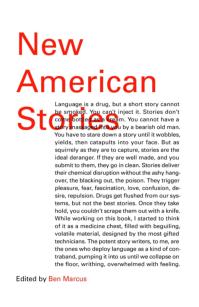|
No matter. The writing
is good here, and there's not a real stinker by any of the 32 authors
represented. Most write social realism -- everyday detail, vernacular voice,
reportage rather than poetics -- and as such a number of the stories capture
the uneasy mood of American culture beset by long wars, crazy economics and
multi-cultural fractionalism.
In the George Saunders
story Home, a young vet returns from an unspecified middle east war to
find his wife and kids shacked up with an old schoolmate in middle class
splendor [two Saabs & an El Dorado in the driveway] while his profane,
ailing mother is being evicted from her rental house with her useless layabout
partner. The schizoid gap between the trailer park class and the suburban
consumer class is only closed by their common incomprehension of what the
imperial American dream is all about. The cruel combat world of 'Al Raz' is
surpassed by the messy dysfunctional world the vet finds when he returns
"home", a cruel reward for his service [the story could've been called "We
Thank You For Your Service", the platitude all who meet the protag
mouth].
The POV is very good,
an impressionism that catches the poetry of illiteracy. A "New Age fist up my
ass" indeed.
Why did I get the
feeling that Jesse Bell inhaled deeply and got into some Edward Gorey before he
wrote his unsettling ethereal story The Early Deaths of Lubeck, Brennan,
Harp and Carr? No social realism here but rather a dreamy Kafkaesque
narrative wherein some horseplay leads to a tragic and treacherous finale.
Despite its well-mapped stylistic antecedents, this one stands apart from most
of the other stories in the anthology. The period imagery, the sense of
symbolic possibility, the reversals, the tight dramatics and the dreamy patina
all combine to make the action unpredictable even though it's entirely
predictable. And while the determinism is relentless, Fate is at least a
painterly adversary.
Who else? Lydia Davis,
a flash story in no more than a hundred words... called Men, with no
plot, no characterization, just a poetic rumination that could be a caption for
an expressionist calendar illustration or the Marlboro Man... Donald Antrim's
Another Manhattan, 3rd person bourgeois stuff, fluid, professional, even
if it all seems -- technically, psychologically -- a bit deja vu. The
Largesse of the Sea Maiden by Denis Johnson isn't bad, gives credence to
the notion that it doesn't matter where you end as long as you remain
interesting [and the portrait of Tony Fido the religious painter who thinks
he's better than Edward Hopper is pretty interesting, as is the guy who
propositions the narrator in a public toilet during a bout of diarrhea][oblique
self-criticism?].
You could swing an
axe, I suppose, as there are so many pieces in here that there has to be
something you don't like. Don DeLillo has a chunk, and you think, well, his
books come wrapped in cellophane, don't they? What would an assembly line
hacker like him know about writing a short story? Sorry to report that
Hammer & Sickle is very good. Fast, real, metaphorically potent...
and what's more, deals with a subject most creative writers know very little
about: economics. At times the frag dialogue explodes as shrapnel, as free
verse, as newscast hypnosis. And all this authentic exposition puts us right
inside today's global America despite the fact that the setting is restricted
to one of those country club prisons that house eminent fraudsters, art lovers
and fallen publishers (like, say, Conrad Black).
You might wonder why
Zadie Smith (England) makes the list, or Rebecca Lee (Canada or somewhere), or
Yiyun Li (China), or NoViolet Bulawayo (Africa); all good stuff to be sure, yet
is this an opportunistic anschluss of the English-speaking world or
what? Perhaps they all teach c.w. in the US. Their inclusion is generous
because how many Americans would make it into a similar anthology of, say,
British writing? And while Hispanics make up 17% of the US population, I don't
see anything that reflects their writing. Just a thought, not a condemnation.
© LR
2015
New American
Stories at Amazon:
US
|
Canada
|
UK
| Australia
*Check out LR's
novel
RADIO
BRAZIL»»
|
